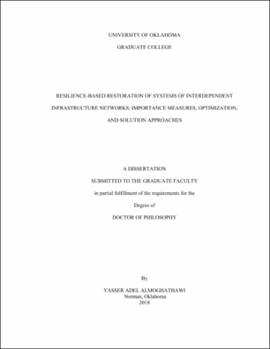| dc.description.abstract | Critical infrastructure networks such as electric power, water distribution, natural gas, transportation, and telecommunications, among others, are the backbone of modern societies as they provide them with the fundamental services that support the economic productivity, security, and quality of life of citizens. However, these infrastructure networks are not isolated from each other but instead, most of them rely on one another for their proper functioning, i.e., they are interconnected and mutually interdependent. Hence, they are highly vulnerable to any disruptive event (e.g., random failures, malevolent attacks, or natural disasters), where the occurrence of a disruption in one infrastructure network could affect other dependent infrastructure networks leading to a more significant adverse impact on societies. Moreover, the proliferation of interdependencies among infrastructure networks has increased the complexity associated with recovery planning after a disruptive event, which becomes a more challenging task for decision makers. Recognizing the inevitability of large-scale disruptions and their impacts to societies, the research objective of this work is to study the recovery of systems of interdependent infrastructure networks following a disruptive event. Accordingly, the purpose of the research components, i.e., main contribution, is to develop: (i) importance measures, and (ii) restoration modeling approaches, that enhance the resilience of the system of interdependent infrastructure networks considering the physical interdependency among the infrastructure networks. The first research component is measuring the importance of the interdependent infrastructure networks components. Hence, the first contribution in this dissertation is developing measures of importance or criticality of components of a system of interdependent infrastructure networks that determine which components adversely affect the resilience of the entire system of interdependent infrastructure networks when disrupted; and prioritize their restoration tasks accordingly. The goal of the proposed importance measures is to identify the critical network components that influence not only (i) the performance of their networks the most when disrupted and restored, but also (ii) the performance of other networks due to their interdependent nature. The proposed importance measures are illustrated through generated interdependent power-water networks. The proposed importance measures represent a useful tool that can help decision makers to identify critical components in their networks following a disruptive event and prioritize their resolution accordingly. The second research component is optimizing the restoration of interdependent infrastructure networks. Hence, the second contribution in this dissertation is developing restoration modeling approaches using mixed-integer programming with the objective of maximizing the resilience of the system of interdependent infrastructure networks while minimizing the total cost associated with the restoration process considering the availability of limited time and resources. The proposed modeling approaches aim to: (i) identify the set of disrupted components to be restored according to their influence on the resilience of the system of interdependent infrastructure networks, and (ii) assign and schedule the restoration tasks to the available work crews. The proposed modeling approaches are illustrated through generated interdependent power-water networks with multiple disruptions scenarios as well as a system of interdependent infrastructure networks after multiple hypothetical earthquakes in Shelby County, TN, United States. The proposed modeling approaches represent a useful tool for decision makers that can help them finding the optimal restoration strategy for their networks following a disruptive event. Moreover, we extend our two research components to address the restoration problem of community structures in a system of interdependent infrastructure networks following a disruptive event to enhance their resilience considering the interdependencies among the infrastructure networks. Accordingly, the third contribution in this dissertation if proposing a restoration model, using mixed-integer programming, to restore community structures of interdependent infrastructure networks with the objective of maximizing the resilience of the system interdependent infrastructure networks. Furthermore, we propose and discuss some community structures importance measures to priorities their restoration process. The proposed community structures importance measures are categorized into two groups: (i) prior to disruption importance measures, and (ii) post disruption importance measures. The proposed restoration model and importance measures for community structures in a system of interdependent infrastructure networks are illustrated through generated interdependent power-water networks. Finally, though the work in this dissertation discusses systems of interdependent infrastructure networks, the developed importance measures and restoration modelling approaches in this dissertation could be applied to any set of physically interdependent networks. | en_US |
